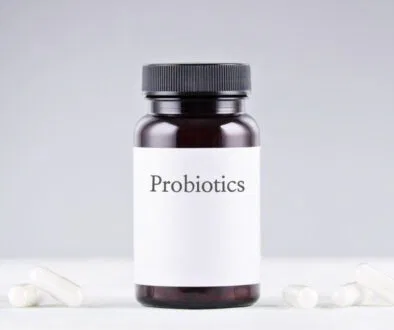When is the Best Time to Take Probiotics?

Published Aug. 31, 2022
They say that there’s a time for everything. Apparently, this also applies to taking probiotics.
Unlike prescription medicines, there are no grave health consequences if you fail to take probiotics at the prescribed time. But taking them at a certain time of the day helps maximize their benefits.
So, when should you take probiotics? First, let us take a look at the science of probiotics.
How Probiotics Work
You may not be aware of it, but billions of bacteria reside within our bodies. However, contrary to popular belief, not all bacteria are bad. Some of them are actually beneficial to our bodies. These species of “good bacteria” are what we come to know today as probiotics.
When there is an imbalance in our body’s bacterial population (microbiome), chaos ensues. The harmful ones will take over and slowly tear down your immune defenses. Due to that, once you come in contact with pathogens, your body will not be able to fight them, resulting in infections and diseases.
Probiotics restore a healthy balance to your microbiome. It replenishes the beneficial bacteria and kicks out the bad ones. Because of that, your immune system gets strengthened.
For the past decades, scientists have been eyeing its potential in preventing diseases. Studies have proven that probiotics play a significant role in various bodily functions.
Although they’re famous for improving gut health and boosting your immune system, various studies have also shown that they can improve mental, oral, reproductive, and skin health.
For probiotics to reach their full potential, they must reach your stomach alive in large numbers. Think of it as your body’s soldiers. The more there are of them, the better their fighting chance against the enemy – the harmful bacteria that cause infections, diseases, and other problems.
When Should You Take Probiotics?

Before we can answer this question, we first need to understand how stomach acid affects probiotic effectiveness. You see, your stomach acid not only helps you digest food. As aforementioned, it also gets rid of most of the bacteria that are present in your food.
Unfortunately, it also kills beneficial microorganisms like probiotics. For that reason, many of the live microorganisms that enter your body are wiped out before they even reach your gut. Thus, to maximize the effects of probiotics, you need to make sure they’ll survive your stomach acid.
A handful of experts agree that the best time to take probiotics is in the morning, around 15 to 30 minutes before your first meal. Since you just woke up and haven’t eaten for several hours, your digestive system is moving at a slow pace.
During this time, your stomach does not produce much acid making it safer for the probiotics to pass through. Taking them with water also helps them bypass the stomach acid and make it all the way to your gut.
However, this should not be taken as a sweeping conclusion. There are many factors that affect probiotic viability. For one, some probiotic strains are much more tolerant of stomach acid.
Some supplements also come in enteric-coated packages specially designed to resist the harsh environment in your stomach. In general, the most ideal time depends on the type of probiotics you’re taking.
-
Live-Strain Probiotics
Live-strain probiotics are usually taken in powder or beverage form.
They don’t have any protective coatings which makes them more vulnerable to stomach acid. As such, they will be more effective if taken first thing in the morning or right before bedtime.
-
Soil-Based Probiotics
As the name implies, soil-based probiotics are microorganisms that are naturally found in soil, unlike other probiotics that are obtained from raw and fermented fruits and vegetables. Some probiotic supplements are also made of soil-based probiotic strains.
Since they usually live in harsh environments, these types of bacteria are usually resistant to stomach acid. Taking them with food increases their chance of survival.
Can You Consume Probiotics Following A Heavy Meal?
Contrary to popular belief, the stomach is a very sophisticated organ. The more food you eat, the more acid and digestive enzymes it releases. Also, food moves a lot slower in a stomach that’s full rather than an empty one.
We don’t recommend consuming probiotics on a full stomach because the likelihood of them reaching your colon decreases. How come? The probiotics will have to withstand your stomach’s acidic and inhospitable environment longer than they would normally.
When Timing Doesn’t Matter

As mentioned, there are probiotics that are highly tolerant of stomach acid. As such, it doesn’t matter when you’ll take them as long as you take them regularly.
Enteric-coated and delayed-release probiotics are examples of this. An enteric coating is a type of protective barrier that is specially designed to resist stomach acid. It’s mostly used in tablets, pellets, and capsules.
Some probiotic strains, particularly those belonging to the Lactobacillus specie, are naturally found in the gut. Thus, they are inherently resistant to stomach acid. This is why when taking probiotic strains like the Bifidobacterium lactis Bl-04, timing doesn’t matter.
Splitting Up Your Dose
Though probiotics rarely have severe side effects, your body may need time to adjust to them. So if you’re still testing the waters, splitting up your probiotic dose might be a good idea.
For example, if the label suggests taking at least three capsules a day, you can take them at different times of the day. One before breakfast, another after lunch, and the last one before going to bed.
This helps prevent the probiotics from overwhelming your gut. It also allows you to assess your reaction to them as well as determine what time of the day it is most effective.
Taking Probiotics At Night

The best time to take probiotics at night is 2 to 3 hours after dinner. Why? During this time, it’s a lot easier for the probiotics you’re taking to travel through your digestive system.
Needless to say, not all probiotics are the same. Due to that, it’s best to read the instructions on the label before you take any given supplement. That way, you can get the most out of it.
How To Make The Most Out Of Probiotics
Below are some tips that’ll help you make the most out of your probiotics:
- Read the recommended dosage instructions on the label of your supplement.
- Store your probiotics in the correct environment so they won’t die.
- Only consume your probiotic supplements at the right time.
- Select a high-quality supplement that contains multiple probiotic strains.
- Opt for a probiotic that best suits your needs and is backed by research.
In Conclusion
Keep in mind that many determining factors contribute to when is the best time for you to take probiotics. However, the general consensus is that it’s best to take probiotics 15 to 20 minutes before your first meal of the day. Alternatively, you may also consume them 2 to 3 hours once you’ve finished dinner.
(Related: Probiotics for Constipation: What You Need to Know)
Benefit From The Latest Advancements In Probiotic Science With Bionaze
Bionaze is a proprietary blend of probiotics proven to promote ear, nose, and throat health, improve digestion, and support your immune system. The active ingredients BLIS K12, and BL-04 are considered among the best probiotics according to science.
Get 25% Off Your First Order when you use BIO25 at checkout!

This Content Has Been Reviewed For Factual Accuracy
This content has undergone thorough fact-checking by our team of internal experts. Learn more about the meticulous editorial standard for our website here.
ADVERTISEMENT

About The Author
Christian Cruz is an experienced blogger with a deep passion for health and wellness. He descends from a long line of educators and is committed to uncovering the facts when it comes to nutrition and health. Over the years, Chris has tackled all sorts of topics in his writing. As a result, millions of people worldwide have read and benefited from his content.




